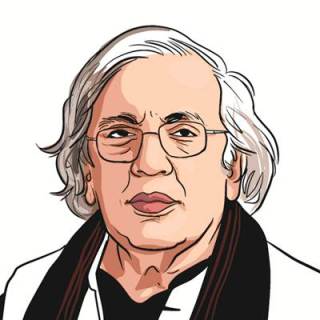Singing in dark times
In times of amnesia and misappropriation, Asian poetry is a house of memory.

Our times are being described as “post-truth” and “fact-free”. One of the major forms of resistance to this global trampling of truth, justice, dignity and memory is poetry. In these times, when there is a growing dominance of untruth, falsehood, amnesia and injustice, poetry still roots itself in truth and justice, in human dignity and possibility, in memory and imagination.
Since the beginning of the 20th century, the concept of Asian poetry seems to have taken roots in many languages across Asia. It could be asserted that a new camaraderie of poetry has been created. Indian poetry, written in many languages, have been a part of this scenario. The traditional ways of looking at poetry have been replaced by a more inclusive approach which while retaining some of the notions of rasa theory, for instance, incorporates new notions of tensions, hidden structures, cultural memory and recall interrogative spaces and redress, autonomy of poetry vis-a-vis history and other modes of knowledge, poetry as a means of moral sustenance and survival, poetry becoming the site of selfhood and its problematics etc. It can be justifiably asserted that in the 21st century, Asian poetry is a site of identity, self-assertion and self-exploration, interrogation and conscience.
In Asia, poetry has been doing many things which it perhaps had not attempted earlier. In Alvin Pang, it tries to “lay claim to the tongue of the roots, the provenance of trees” while through Emiko Mayashita, it “rinses the leaves, the leftovers of green caterpillars”. Hasmik Simonian finds “I am too much, countless, squeezed with everything in this small belly” and Yang Lian is “refusing to let the poem sink into dead indifferent beauty”. Shahnaz Munni hopes to come to “the grief that struck no one”. Saw Wai notices that “life is driving like a train/ Tents on the left/ Buildings on the right/ Water on the left/ Earth on the right”. Nguyen Hoang Viet asks, “Who among us/Is not endowed with a human heart?” And urges that “from poetry make yourself a torch”. Najwan Darwish discerns “history’s snow that covers both the murdered and the murderers” and finds that “the seats of hope are always reserved”. Ko Un believes “my poems will have no full stops tomorrow and the days after” and accords that “I am composed of many ‘I’s/ In this world, somewhere in this world”. Thongbay Photishane finds ways to make room for each other’s hope and Kutti Revathi notes sharply “enduringly sacred God’s dirt”. Rosa Jamali finds “this weeping human child, lamenting two thousand years in my arms” and discerns “And we got used to the standstill”.
Amir Or reflects “we no longer know when/ the barbarians have come to us”. “I would change the Sun”, says Gvantsa Kereselidze. Chheangly Yeng acknowledges “at the end, all over me were inscripted names/ of those who thought I could carry their sins away”. Zebo Mirzaeva wonders, “in fact true love is in our life/ Always humbled, always oppressed’. Chador Wangmo is able to meet a woman singing, “It’s raining in my bag”. For K Satchidanandan, “A tree is a dictionary of leaves/ My branches fill with poems/ the history of clouds”. Nomaan Shauq warns “Hold tight, each one of you/snake tails of your own/Country, religion, convictions.”. In Udayan Vajpeyi, “From somewhere faraway, mother’s presence gathers close around me/spreads over my soul like a shadow”. And Sitanshu Yashaschandra looks for “secret meaning of the night”.
There are many claimants to truth, many pretenders as well. Politics, religion, science, technology, ideologies, media, etc. all claim to possess truth, many a time, aggressively, exclusively stubborn and any of these “truths” tend to create regimes of exclusivity, unquestionability and mindless following. Poetry, on the other hand, while daring to speak truth in spite of adversities, makes it participative and refuses to create any regime.
A lot of poetry these days is taking place in circumstances of mindless, murderous violence. Since poetry demolishes dichotomies between “us” and “them”, re-energising our basic humanness, it is often pitched against such violence. Because of its resistance, its courage and insistence on conscience, poetry is a genre of plurality and nonviolence.










.png)




























No hay comentarios:
Publicar un comentario